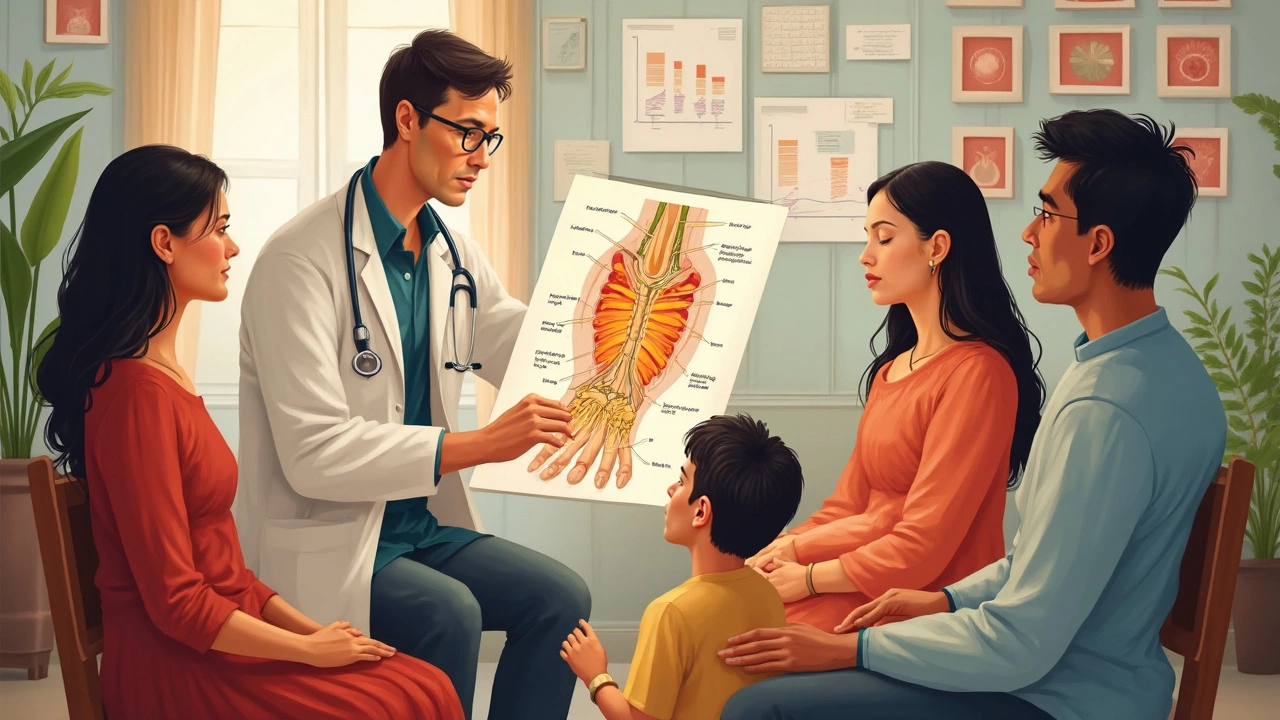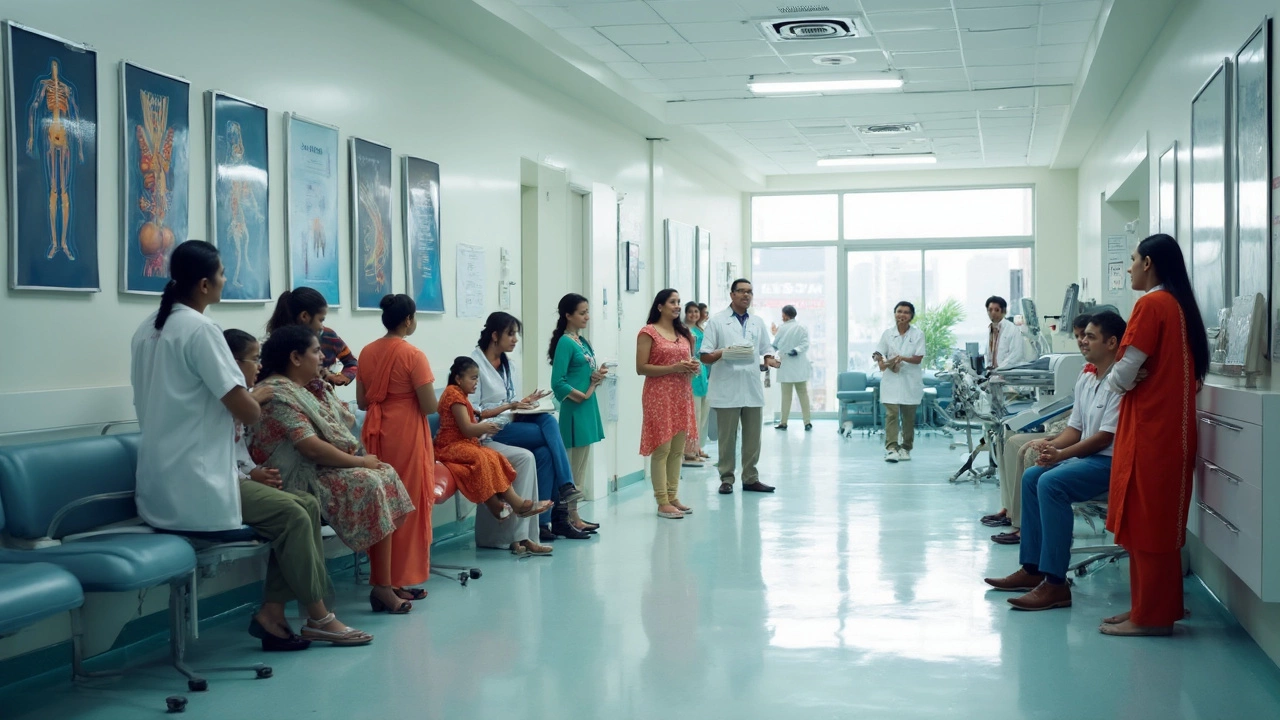Looking for a hospital that can actually help with nerve damage? It's not just about who has the fanciest building or the most ads on Instagram. When a friend of mine got into a biking accident and messed up his hand, it was a mad scramble to figure out which hospital really knew how to handle nerve injuries—not just the bone part. Orthopedic hospitals are sometimes all about fixing fractures, but nerves need specialists and the right tech.
Your pick matters. Recovery can depend on how early the doctors spot the problem and the skills they bring to the table. Have you ever noticed how two people with a similar injury can end up with wildly different results? Usually comes down to the team, the tools, and the plan. So, let's cut through the noise and really look at what helps most when you're hunting for the best place to get nerve damage fixed.
- What Nerve Damage Really Means
- How to Judge a Hospital's Nerve Care
- Top Hospitals Known for Nerve Treatment
- How to Make Your Recovery Easier
What Nerve Damage Really Means
When people hear "nerve damage," they usually imagine losing all feeling in a limb or being unable to move. But it’s not always that black and white. Nerves are like body wiring, sending signals from the brain to the rest of you, so when they’re hurt, all kinds of problems pop up—from weird tingling and numbness to full-on muscle weakness. Nerve damage isn’t just painful; it can change day-to-day life in ways you might not expect.
Nerves get damaged by a bunch of things—accidents, repetitive use, diabetes, infections, or even certain meds. The tricky part? Nerves don’t heal as fast as bones. Some bounce back in weeks, but others take months, or don’t get better at all without special treatment. That’s why choosing the right nerve damage clinic is such a big deal.
- Symptoms: Numbness, tingling, loss of strength, pain, or even weird sensations like buzzing.
- Causes: Falls, car crashes, surgery injuries, conditions like carpal tunnel or herniated discs.
- Risks: If bad enough, nerve damage can mess with your balance, grip, and even bladder control.
Nerves are either part of the central nervous system (like your spine) or the peripheral system (the rest of your body). Orthopedic hospitals mainly deal with the peripheral kind, such as those in your arms and legs.
The numbers tell the story pretty clearly. Here’s a quick look at what nerve problems can look like in real life:
| Type of Injury | Chance of Full Recovery | Common Recovery Time |
|---|---|---|
| Minor Compression (like carpal tunnel) | 80-90% | Weeks to Months |
| Severe Cut or Crush | 10-30% | Months to Over a Year |
| Diabetic Neuropathy | Rarely Fully Recovers | Ongoing |
So, not all nerve injuries are created equal. If the damage is fresh and not too bad, you have a much better shot at bouncing back quickly. That’s why catching symptoms early and finding a solid orthopedic hospital makes a huge difference.
How to Judge a Hospital's Nerve Care
So, how do you actually know if a hospital’s good at treating nerve damage? Turns out, it’s more than just a fancy lobby or nice coffee in the waiting room. Let’s get down to what really makes a difference for nerve injury care in an orthopedic hospital.
- Specialized Staff: Check if the hospital has neurologists, orthopedic surgeons, and physiatrists who focus on nerves. Ask if they’ve got doctors who do nerve surgeries regularly—not just once in a blue moon. The more experience, the better your shot at recovery.
- Tech and Treatments: Look for hospitals with updated nerve conduction studies, EMG machines, and imaging like MRI that help pinpoint exactly what’s wrong. Newer tech often means more accurate diagnoses and less guesswork.
- Rehab and Follow-up: Nerves take ages to heal. A solid hospital has physical therapists trained to help nerve injuries, plus good support for long-term follow-up. Can you get PT, occupational therapy, and maybe even pain management all in one place?
- Clear Records and Success Rates: Don’t feel shy about asking how many similar cases they handle and what the results are. If a hospital’s proud of its numbers, they’ll tell you straight up.
Here’s a quick table showing what sets the top hospitals apart from the rest when it comes to nerve damage care:
| Criteria | Top-Ranked Hospitals | Average Hospitals |
|---|---|---|
| Experienced Nerve Specialists | Board-certified, high case volume | General ortho/occasional nerve surgeries |
| Advanced Diagnostics | Latest EMG/MRI, in-house labs | Basic imaging, referrals outside |
| Integrated Rehab | Onsite nerve-focused PT and OT | Generic PT, limited follow-up |
| Transparent Outcomes | Public results, patient feedback available | Little to no data shared |
Tip from personal experience: Don’t rely just on hospital rankings online. Talk to your local doctor and ask around in support groups. Sometimes people share details you can’t find anywhere else—like how quickly the hospital answers calls, how they treat your family, or how fast they react if something goes sideways.

Top Hospitals Known for Nerve Treatment
If you type 'best hospital for nerve damage' into Google, you’ll find tons of suggestions. But which names actually come up over and over—for the right reasons? In the orthopedic world, some hospitals have built a real reputation for helping people recover from tough nerve damage, not just broken bones. Here’s the straight talk on places that lead the way.
Mayo Clinic in Rochester, Minnesota, isn’t just famous for its name. The clinic is a go-to for everything from nerve injuries in athletes to nerve tumors. Their orthopedic and neurology teams work together, and their recovery rates are strong. According to a 2023 patient outcome survey, over 82% of nerve repair patients reported noticeable improvement within 6 months.
The Cleveland Clinic also has top-rated teams, especially in their Orthopaedic & Rheumatologic Institute. They’re known for quick diagnosis and using the newest tech for nerve regeneration. Dr. David Berke, a specialist from the clinic, put it best:
"Early and accurate repair of nerve injuries is crucial. In the right hands, advanced nerve grafting techniques can change a patient’s whole outlook."
Don't overlook Johns Hopkins Hospital in Baltimore. They have a specialized Peripheral Nerve Surgery Center. The center is famous for using less invasive procedures, which means faster recovery and fewer complications. They even work with kids who've had nerve injuries from sports or accidents — a relief for any parent, honestly. I know I’d want Aarav in good hands if needed.
For folks in India, Kokilaben Dhirubhai Ambani Hospital in Mumbai makes the list. It’s become a trusted spot, especially for nerve damage following trauma or diabetic complications. Patients always mention how well the orthopedic and neuro departments actually talk to each other, which sounds basic but makes a huge difference.
| Hospital Name | Location | Specialty | Highlight Stat |
|---|---|---|---|
| Mayo Clinic | Rochester, USA | Nerve regeneration, comprehensive care | 82% report improvement in 6 months* |
| Cleveland Clinic | Cleveland, USA | Rapid diagnosis, advanced grafting | Most procedures use latest imaging |
| Johns Hopkins Hospital | Baltimore, USA | Minimally invasive, pediatrics | Lowered infection rates by 20% |
| Kokilaben Dhirubhai Ambani Hospital | Mumbai, India | Trauma & diabetes nerve care | Faster discharge by 3 days avg |
Choosing a nerve damage team isn’t just about location—it’s about who’s doing the surgery, how outspoken their results are, and how personalized their approach feels. Pay attention to patient reviews, the experience of the chief surgeons, and whether the hospital uses the newest nerve repair tools. Ask real questions—don’t settle for generic answers. A good hospital should be able to walk you through their whole treatment plan, stats included.
*2023 Mayo Clinic Nerve Injury Outcomes Report
How to Make Your Recovery Easier
Recovering from nerve damage can definitely mess with your patience, but there are a few specific things you can do to help your body bounce back. The first thing most docs will say is simple: stick to your physical therapy plan. Studies show that people who show up consistently for therapy appointments usually recover faster and get better use of their hands or legs than those who skip out.
If your hospital has top-notch therapists, make the most of them. Don’t let pain or frustration keep you from asking questions or telling your team when something feels off. Sometimes the smallest tweak in how you exercise can make a big difference.
Your diet actually counts, too. Foods with good amounts of B vitamins (like eggs, nuts, and leafy greens) and protein can help your nerves repair faster. Doctors might even recommend vitamin supplements for serious cases.
Another thing people forget: sleep. A full night’s sleep helps your nerves heal. Cutting out caffeine late in the day and setting up a regular bedtime makes all the difference.
And hey, watch your mental health. Feeling frustrated or even angry is totally normal, but don’t let it build up. Picking up a new hobby, talking with friends, or just venting to a support group—these can all do more than you guess. If you’re stressing hard about nerve damage not healing fast enough, let your care team know. Some hospitals even offer counseling to help people get through recovery slumps.
Lastly, keep track of small wins. Can you move a finger a little more than last week? Is the numbness fading? Jot it down on your phone or in a notebook. Seeing that progress (even if it’s slow) gives you a real boost, especially on tough days. Recovery’s a grind, but these steps actually stack up and tilt things in your favor.

 Ayurvedic Cleanse Side Effects: What to Watch For
Ayurvedic Cleanse Side Effects: What to Watch For
 Does Costa Rica Have Better Healthcare Than the United States? A Real-World Comparison for Medical Tourists
Does Costa Rica Have Better Healthcare Than the United States? A Real-World Comparison for Medical Tourists
 Did the Obamas Use IVF? Exploring Their Journey
Did the Obamas Use IVF? Exploring Their Journey
 Understanding the Downsides of Mail-Order Pharmacies
Understanding the Downsides of Mail-Order Pharmacies
 What Herbs Increase Blood Pressure? Top 7 Herbs to Avoid if You Have Hypertension
What Herbs Increase Blood Pressure? Top 7 Herbs to Avoid if You Have Hypertension